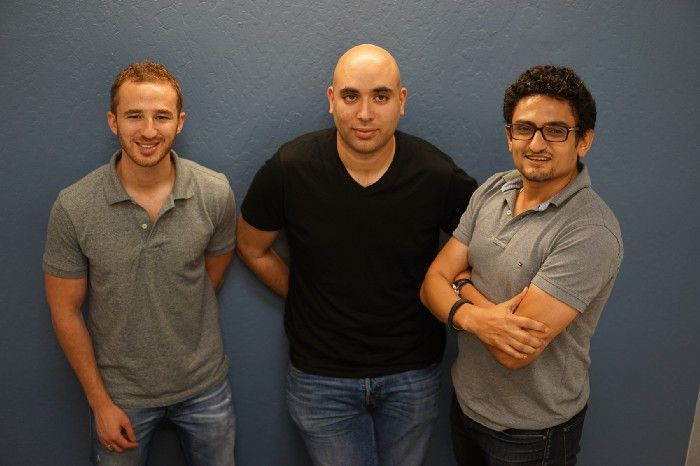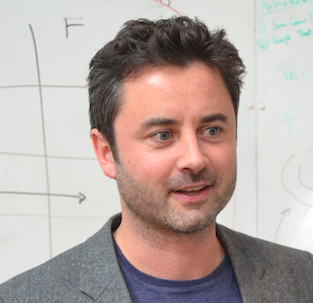Our first seed investments.
Today, at Demo Day, I’m excited to reveal our first three non-accelerator seed investments — Parlio, This, and NewsWhip.

When I announced our new media partnerships in February, I hinted that that we would begin to expand the impact of Matter beyond our four walls by launching a seed investing initiative.
Today, at Demo Day, I’m excited to reveal our first three non-accelerator seed investments — Parlio, This, and NewsWhip.
I’ll introduce you to the extraordinary founders of each of these teams below. But first I’d like to explain why we’re expanding into non-accelerator seed investments in the first place.
The goal is simple — to scale our impact. There are entrepreneurs building the future of media that deserve our support that, for one reason or another, cannot participate in our 20-week accelerator program in San Francisco. We think it’s time to support them and we think that by doing so we will also be building a more scalable way of supporting our alumni network.
With our accelerator program we have built a solid base of 67 entrepreneurs across 25 companies in 4 cohorts. Through the magic of Slack we are now able to unite our entrepreneurs and extend our collaborative community into the online world in a way we haven’t been able to before. Up until now, we’ve been limited by the constraints of our physical space in SF. Now, we’re experimenting with how to break those constraints.
We see an opportunity to bring more entrepreneurs who fit our mission into our ecosystem and to do it at a faster rate than the current pace of six companies per accelerator cohort.
Our accelerator program is still our core focus and will remain that way for the foreseeable future. But, just like we teach our entrepreneurs, it’s always more important to focus on the verbs of what you want to accomplish rather than the nouns of how you’ve accomplished it in the past.
We are an accelerator but we are not just an accelerator. We are the hub of a scalable network of media innovators. And its time to scale this network. So we are beginning to make limited, non-accelerator seed investments in extraordinary media entrepreneurs that are aligned with our mission.
I’m excited to start with the extraordinary people behind these three companies — Wael Ghonim of Parlio, Andrew Golis of This, and Paul Quigley of NewsWhip.

Wael Ghonim of Parlio
Wael Ghonim knows the power of social networks. He helped spark a revolution using Facebook — and it brought down a regime.
“In the Egyptian Revolution — Revolution 2.0 — no one was a hero, because everyone was a hero.” said Wael in his Ted Talk: Inside the Egyptian Revolution. “Everyone contributed something, small or big, to bring us one of the most inspiring stories in the history of mankind when it comes to revolutions.”
But while Wael may quite possibly be the world’s greatest example of how someone can leverage the power of technology to connect and organize to change the world, he sees that technology still falls short when it comes to fostering the rich dialogue necessary to build a more informed society.
“More and more people are coming online, we’re very connected in this world now,” says Wael, “But there aren’t enough conversations happening between different stakeholders that help people get informed.”
“There should be a place where online discussions are diverse and civil and a place where people who have some sort of domain knowledge can feel empowered to share their knowledge with a more general public audience that are interested in getting better informed about issues.”
That place didn’t yet exist. So, Wael and two co-founders, Osman Osman and Karim Fateem, decided to build that place. It’s called Parlio.
Their vision for Parlio is to create “a vibrant community of people engaging in discussions and exchanging perspectives on issues in the world around them.”
It’s a big vision that they approach humbly — testing, learning, and iterating on what it takes to spark high-quality, informed dialogue.
“What we are trying to accomplish here is to bring together stakeholders — media people, people in academia, students, professors, policy makers, and activists — and trying to create the right incentives for each group to engage in conversation,” says Wael.
“Imagine the possibilities that can happen here.”

Andrew Golis of This.
We are in a golden age of journalism. We just aren’t living up to it — yet.
That’s the opportunity Andrew Golis identified while at FRONTLINE and then acted on as an Entreprenuer-in-Residence at The Atlantic. Having been on the ground floor of Talking Points Memo, he’d been in a media start-up before. Now was the perfect time to launch his own.
“The web has created a golden age for journalism and for media more broadly.” says Andrew. “Because of it we have instant access stories and ideas of an inspiring quality, ambition and diversity. And there’s a hunger to connect to that media.”
But that hunger wasn’t being fed by the viral media companies that began to dominate our feeds.
“I became increasingly frustrated with the ways in which the dominant social platforms and the dominant modes of distribution left out a lot of the things that I was most excited and passionate about,” says Andrew. “And I really wanted to build a platform where our passion for media, for a particular story or idea, a particular piece of reporting, was the building block, the core foundation, of the whole network.”
So he built This.
This. is a social network with a simple premise: Follow the people you trust, give thanks for their links and share the links you love. Each user can share just one link a day.
Why one link a day? Andrew explains: “If you limit people to sharing just one link a day, you give them the opportunity to express passion. That scarcity makes the act of sharing as valuable as that link feels to the user who loves it. From there, we can help people not only find stories and ideas worth their time, we can begin to convene conversations around shared passion.”
And so far, people have been loving it. In fact, This. has people clamoring for an invite.
What we love about Andrew is he has that quality that defines an entrepreneur. Instead of just complaining about the content coming out of viral media companies, he’s focused on understanding their incentives. As he says: “My attitude about that is: Don’t hate the player, hate the game.”
Andrew’s bet is that he can change the game.
“The mechanics of the social web set the rules for what kind of media spreads and therefore what people read, watch or hear.” he says.
“We are trying to re-wire that core relationship by giving people a place to express their passion, create an identity they’re proud of and find media that’s really worth their time. This. is an attempt to re-wire the actual distribution of journalism in a way that will create a set of incentives for media companies that will support them at their most ambitious.”

Paul Quigley of Newswhip
Like most successful start-ups, NewsWhip started by failing forward. Co-founder Paul Quigley’s first idea was to import the Huffington Post model to Europe, starting back home in Ireland.
A recovering lawyer turned first-time entrepreneur, Paul and his co-founder Andrew Mullaney found it was both hard and disheartening to compete for those pageviews. At the end of the day, he realized, “you’re just making more stuff for the Internet.”
Then it dawned on him. Instead of making more noise on the Internet, why not leverage technology to wrangle that noise and make sense of it? What if you could find the stories that matter?
NewsWhip was born (again).
Their mission is to find the most interesting stories in the world by tapping into the streams of millions of stories that are being shared and talked about on social networks every day. NewsWhip then provides those data and insights to media companies, so they know which events and stories will be important before anyone else does.
“By looking at the data and by looking at the streams that journalists have access to through our platform, they can see how to frame their stories so they’re more interesting for people to read, to share, to comment on,” explains Paul.
But doesn’t that mean newsrooms will just be sharing more cat photos? Absolutely not.
“I don’t buy the idea that the crowd is dumb. Cats do well online, but hard news and thoughtful analysis does very well, too,” says Paul. “There are billions of people on social networks deciding what to pass on to their friends. Sometimes they pass on cats, but a lot of the time they’re passing on the stories and events that we care about.”
You can find what matters in the noise and build a more bottom-up newsroom in the process. As Paul says, “A democratic input to the newsroom is better than a dictatorship.”
Welcome to Matter.
As you can see, each of these investments fits our mission to support entrepreneurs building scalable media ventures that create a more informed, connected, and empowered society. Our accelerator program wasn’t a fit for them — but our mission and community sure was.
Welcome to the Matter community Wael, Osman, Karim, Andrew, Paul, and Andrew!
Originally published on Medium

